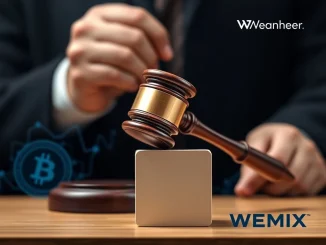
The digital asset landscape in South Korea is at a pivotal moment. The nation’s burgeoning Korean fintech industry is making a significant push for changes to how virtual assets are regulated, specifically urging the Democratic Party of Korea (DPK) to ease restrictions. This move aims to open the doors for businesses and institutional investors to participate more freely in the virtual asset space and offer crypto-related services.
Why is Korean Fintech Pushing for Change?
The Korean fintech sector sees immense potential in virtual assets and blockchain technology. However, existing regulations are perceived by many within the industry as overly restrictive, hindering innovation and growth. These companies believe that allowing greater participation from established firms and institutions is essential for the market’s maturity and for South Korea to remain competitive on the global stage.
Their advocacy centers on creating a regulatory environment that balances consumer protection with the need for market development. By easing certain rules, they argue, South Korea can foster a more dynamic and innovative financial ecosystem.
Opening Doors for Crypto for Institutions
A key focus of the recommendations is enabling crypto for institutions. Currently, institutional participation in the South Korean crypto market is limited due to regulatory hurdles. The fintech industry’s plea includes provisions that would make it easier for asset managers, investment firms, and other institutional players to invest in or offer services related to virtual assets.
Allowing crypto for institutions is often seen as a critical step towards legitimizing the market and bringing in significant capital and expertise. This could lead to increased liquidity, more sophisticated financial products, and greater stability within the virtual asset market.
Understanding the Virtual Assets Korea Landscape
The current state of virtual assets Korea is characterized by a cautious regulatory approach, largely focused on preventing money laundering and protecting retail investors. While trading platforms exist and are regulated to some extent, broader corporate and institutional engagement has faced significant barriers.
The fintech sector’s recommendations seek to address these limitations, proposing a framework where virtual assets Korea can thrive not just as a speculative market for individuals, but as a legitimate asset class integrated into the broader financial system. This includes clarity on issues like custody, taxation, and permissible activities for regulated entities.
Proposed Changes to South Korea Crypto Regulation
The core of the fintech industry’s request lies in revising existing South Korea crypto regulation. The specific details of the nine policy recommendations were not fully disclosed in the initial report, but they are expected to cover areas such as:
- Streamlining licensing processes for crypto businesses.
- Providing clearer guidelines for institutional investment in virtual assets.
- Facilitating the development of new crypto products and services by regulated entities.
- Potentially adjusting rules around security token offerings (STOs) or other forms of tokenization.
The policy agreement ceremony scheduled for May 15 with the DPK is a crucial moment for these proposed changes to South Korea crypto regulation to gain political traction.
What Does This Mean for DPK Crypto Policy?
The engagement with the Democratic Party highlights the growing political significance of DPK crypto policy. As a major political force, the DPK’s stance on virtual asset regulation can significantly influence the future direction of the industry in South Korea.
The willingness of the DPK to hold a policy agreement ceremony with innovation-focused ventures suggests an openness to considering changes. The nine policy recommendations will directly inform the discussion around future DPK crypto policy, potentially leading to legislative proposals or regulatory adjustments that could reshape the market landscape.
Potential Benefits and Challenges
Easing regulations could bring several benefits:
- Innovation: Encourage development of new services and technologies.
- Investment: Attract domestic and international capital.
- Competitiveness: Position South Korea as a leader in the digital asset space.
- Job Creation: Foster growth in the fintech and blockchain sectors.
However, challenges remain:
- Consumer Protection: Ensuring safeguards against fraud and market manipulation.
- Financial Stability: Managing potential systemic risks from virtual asset integration.
- Regulatory Clarity: Implementing changes effectively and consistently.
Looking Ahead: The Path for Virtual Assets Korea
The upcoming meeting between the Korean fintech industry and the DPK is a key event. The presentation of the nine policy recommendations marks a formal step in advocating for significant changes to South Korea crypto regulation. The outcome of these discussions will be crucial in determining the future accessibility of virtual assets Korea for both businesses and everyday citizens, and will set the tone for future DPK crypto policy decisions regarding crypto for institutions.
Summary
South Korea’s fintech sector is actively lobbying the Democratic Party to ease South Korea crypto regulation. Their goal is to allow businesses and institutions greater access to virtual assets Korea and the ability to offer crypto services. This push for more permissive DPK crypto policy, including enabling crypto for institutions, is driven by the desire to boost innovation and competitiveness. The upcoming policy meeting on May 15, where nine recommendations will be presented, is a critical step in this ongoing effort to reshape the regulatory landscape for virtual assets Korea.



